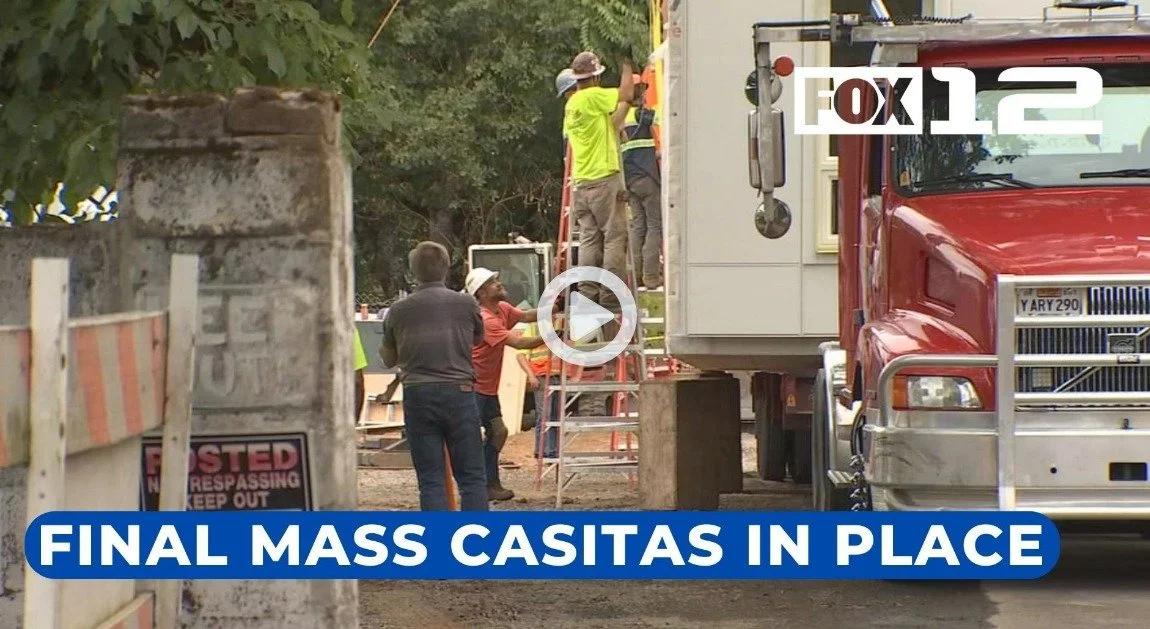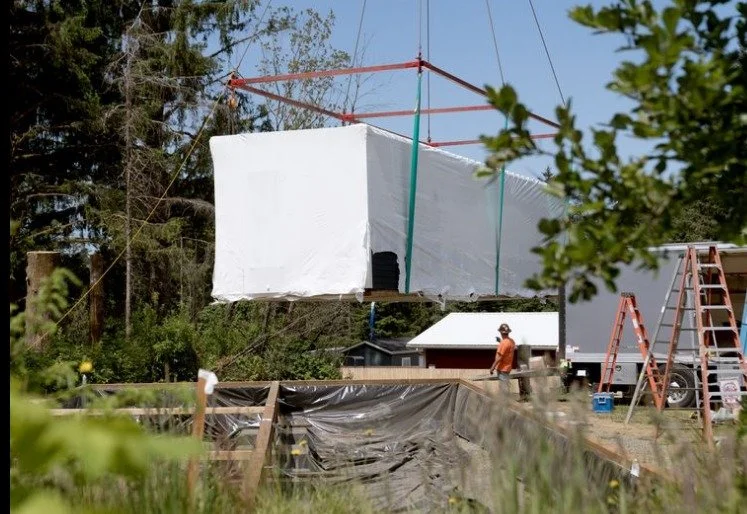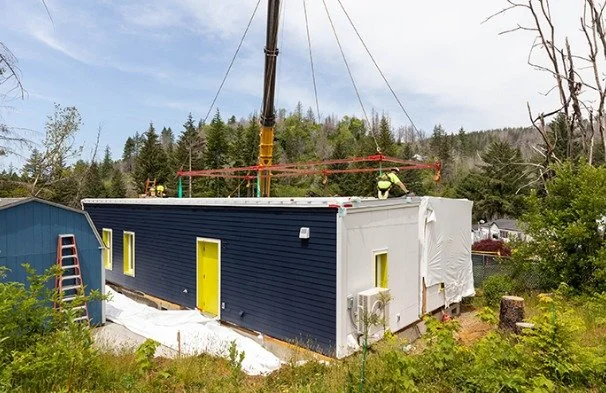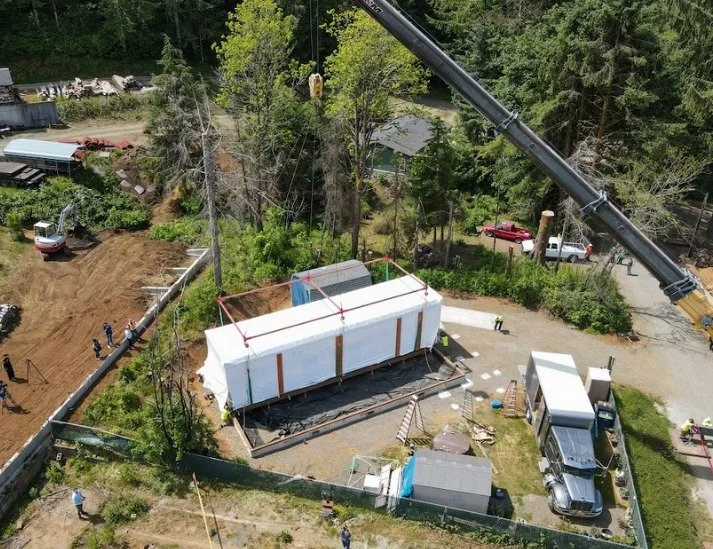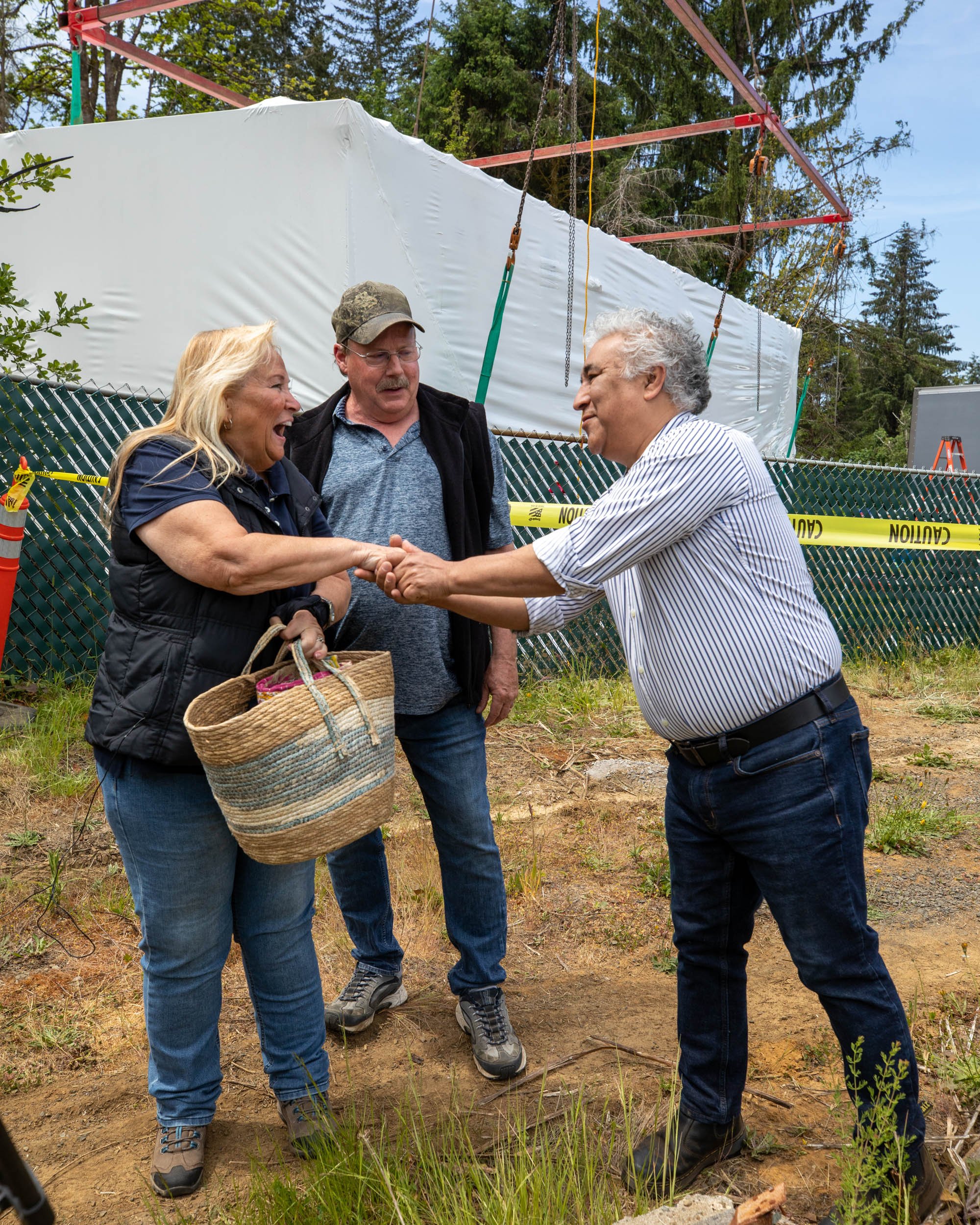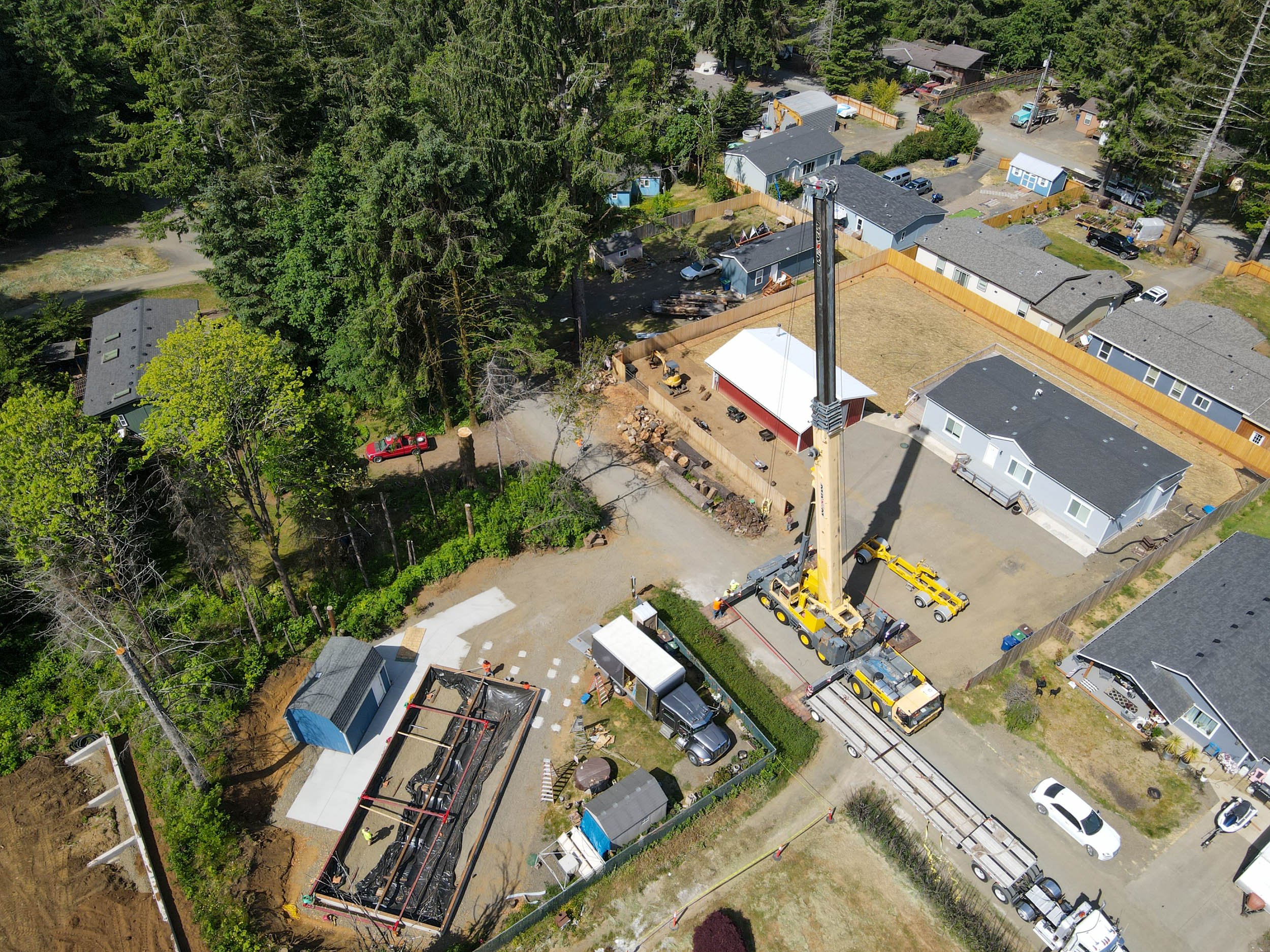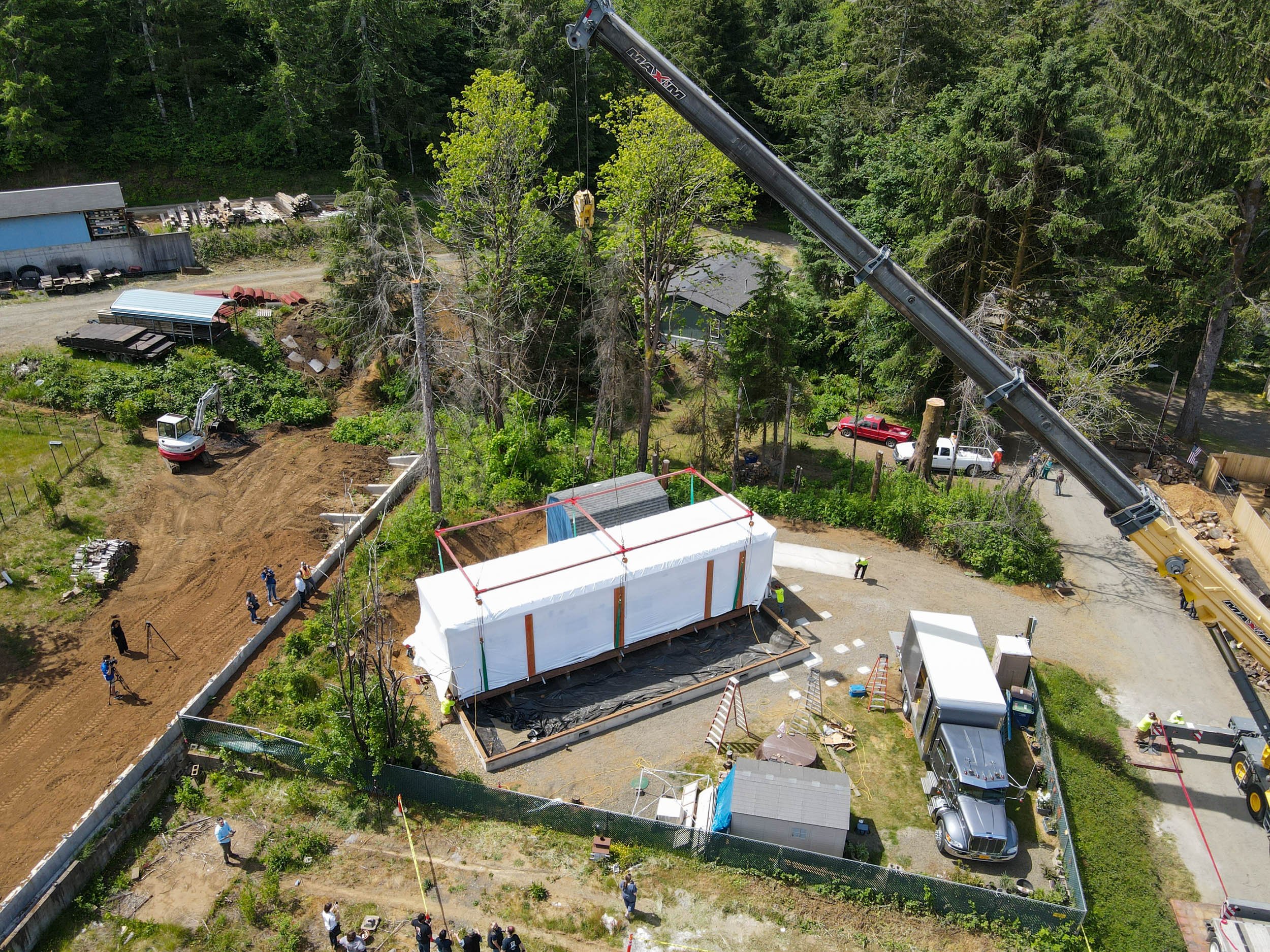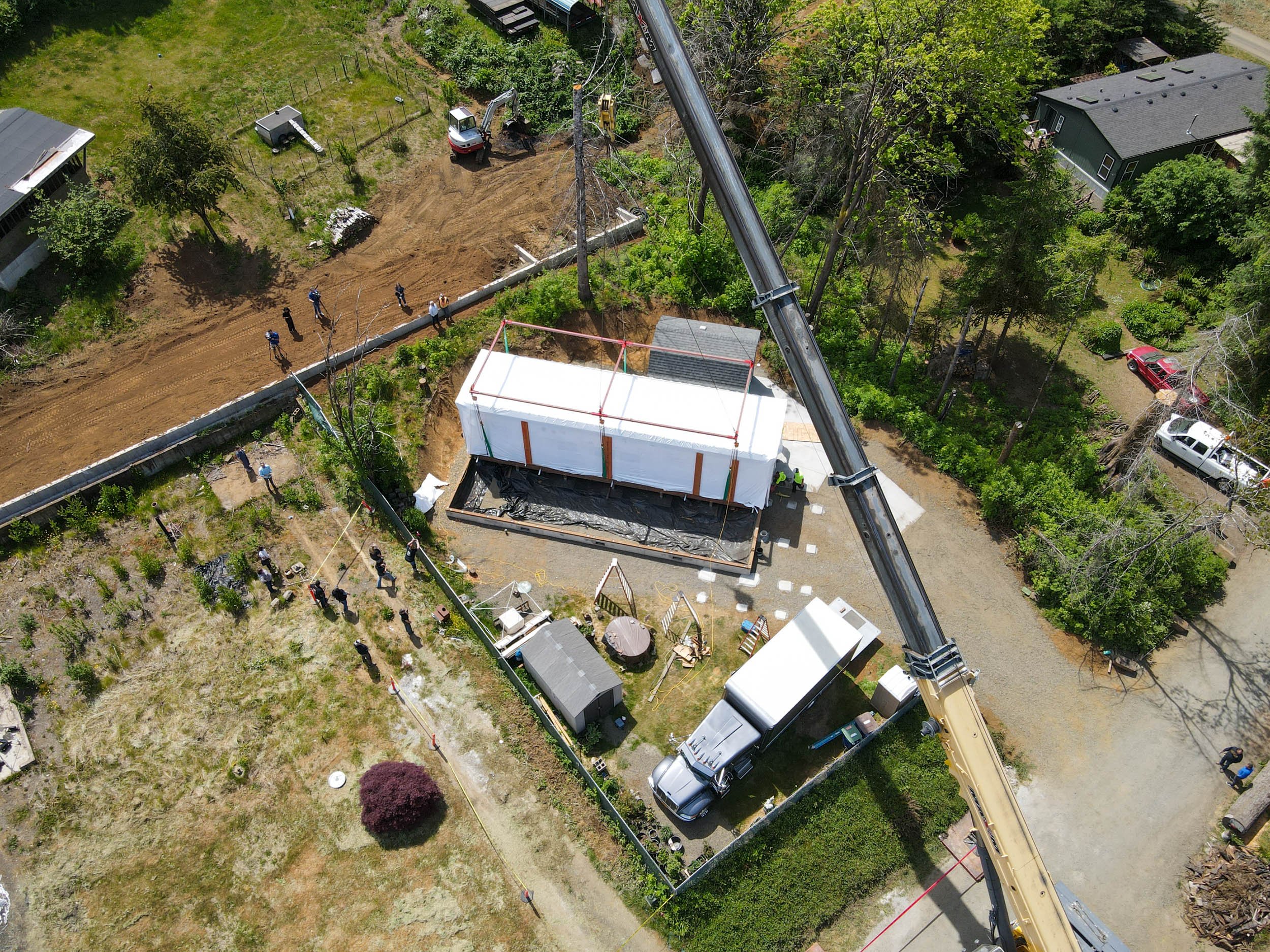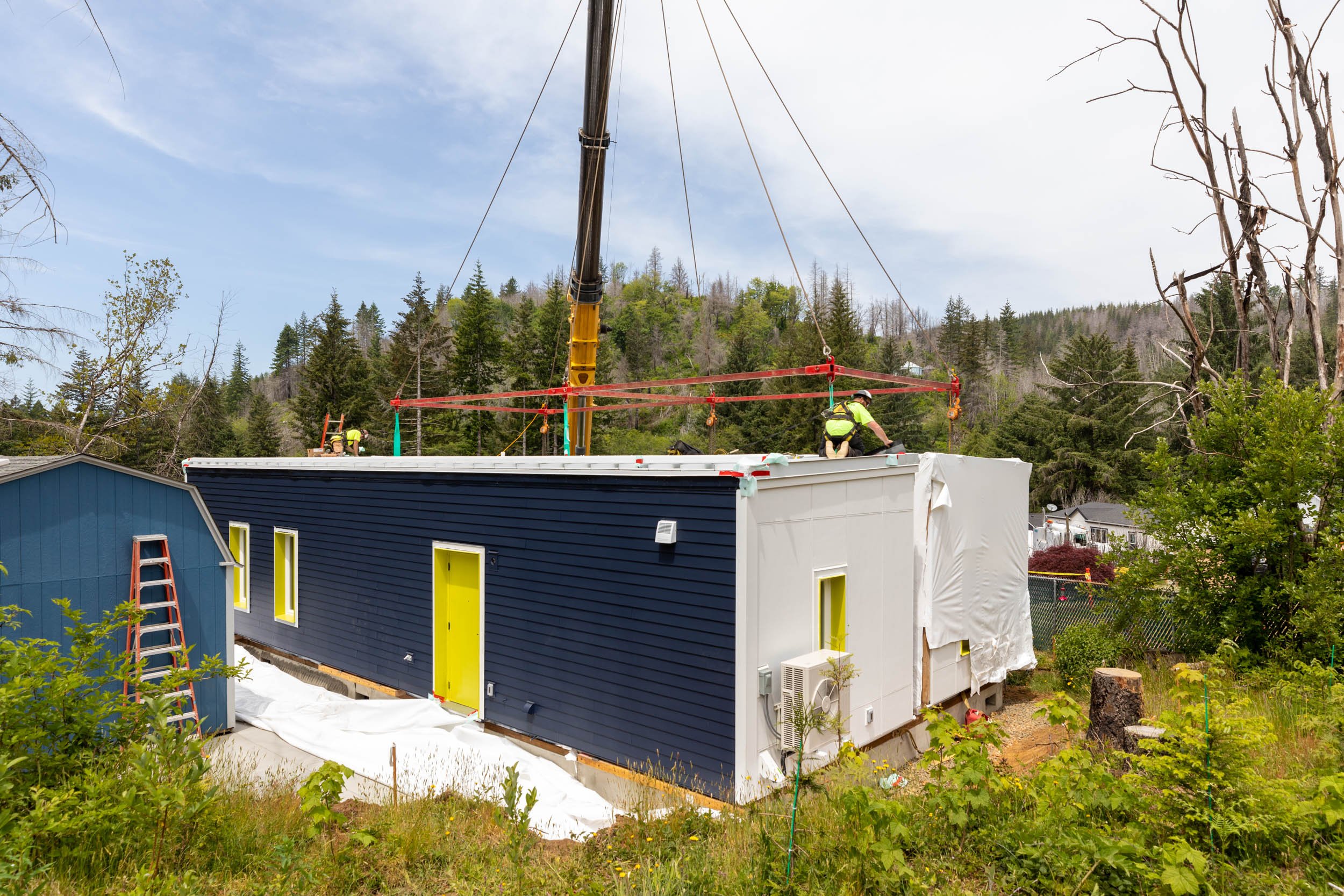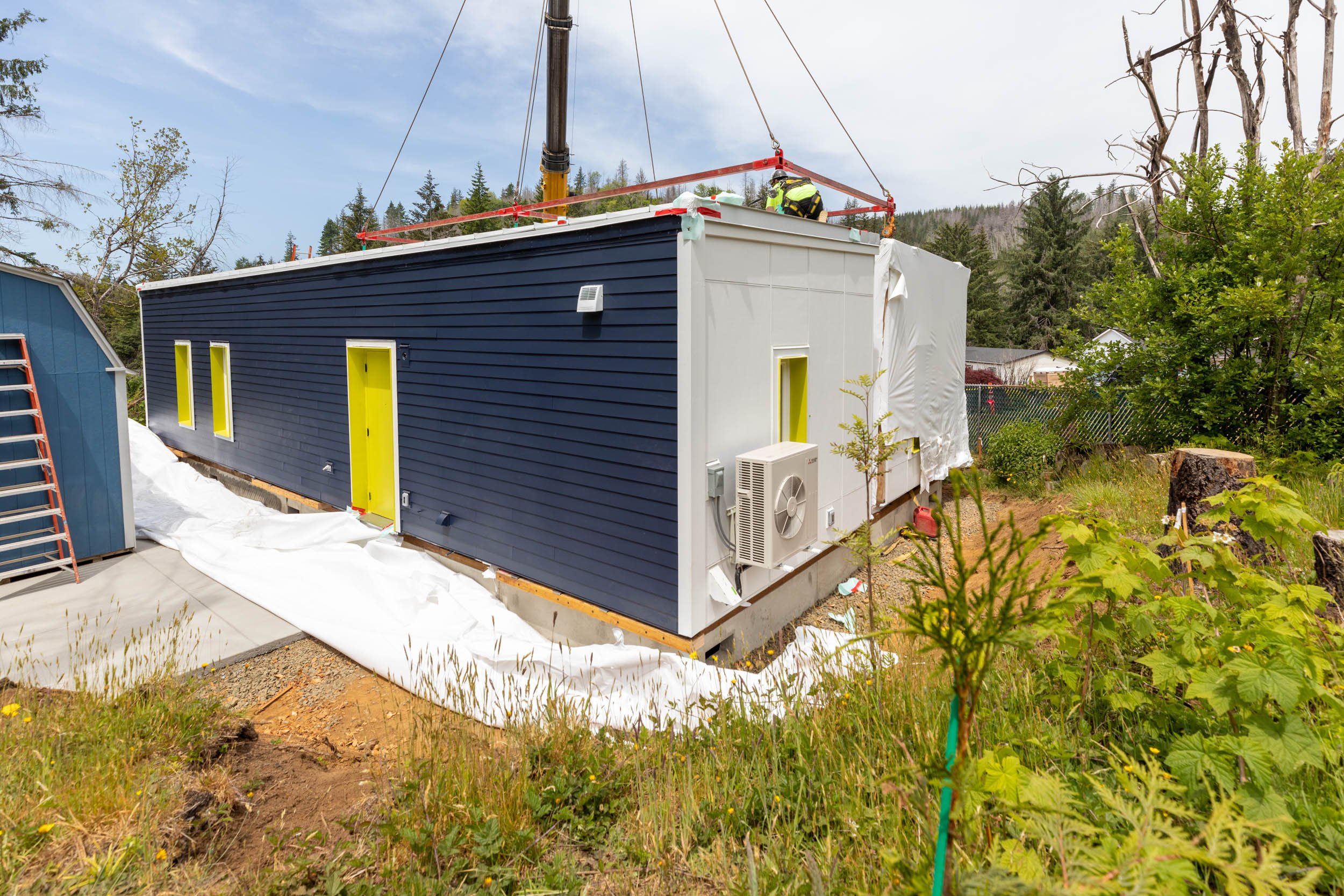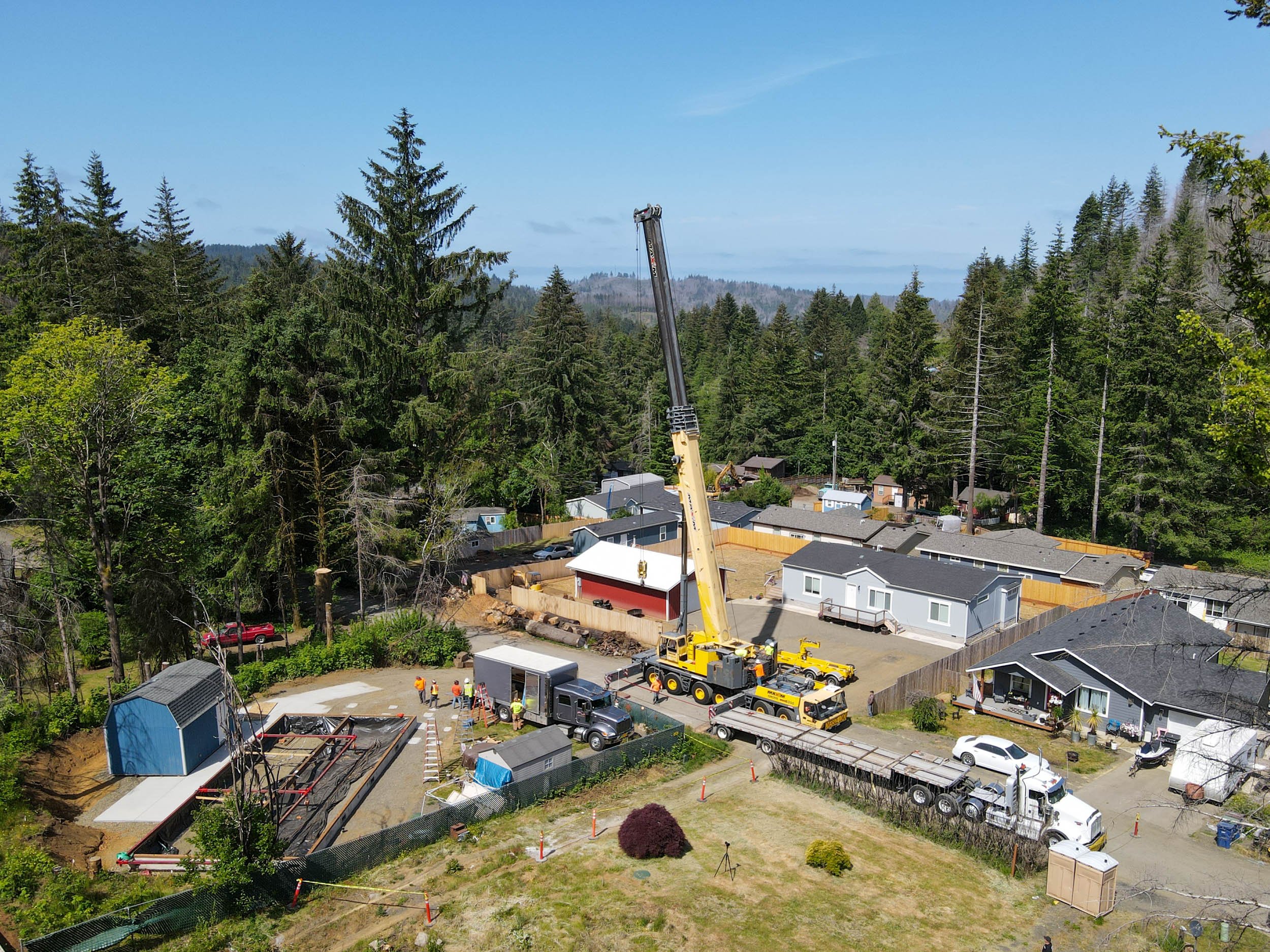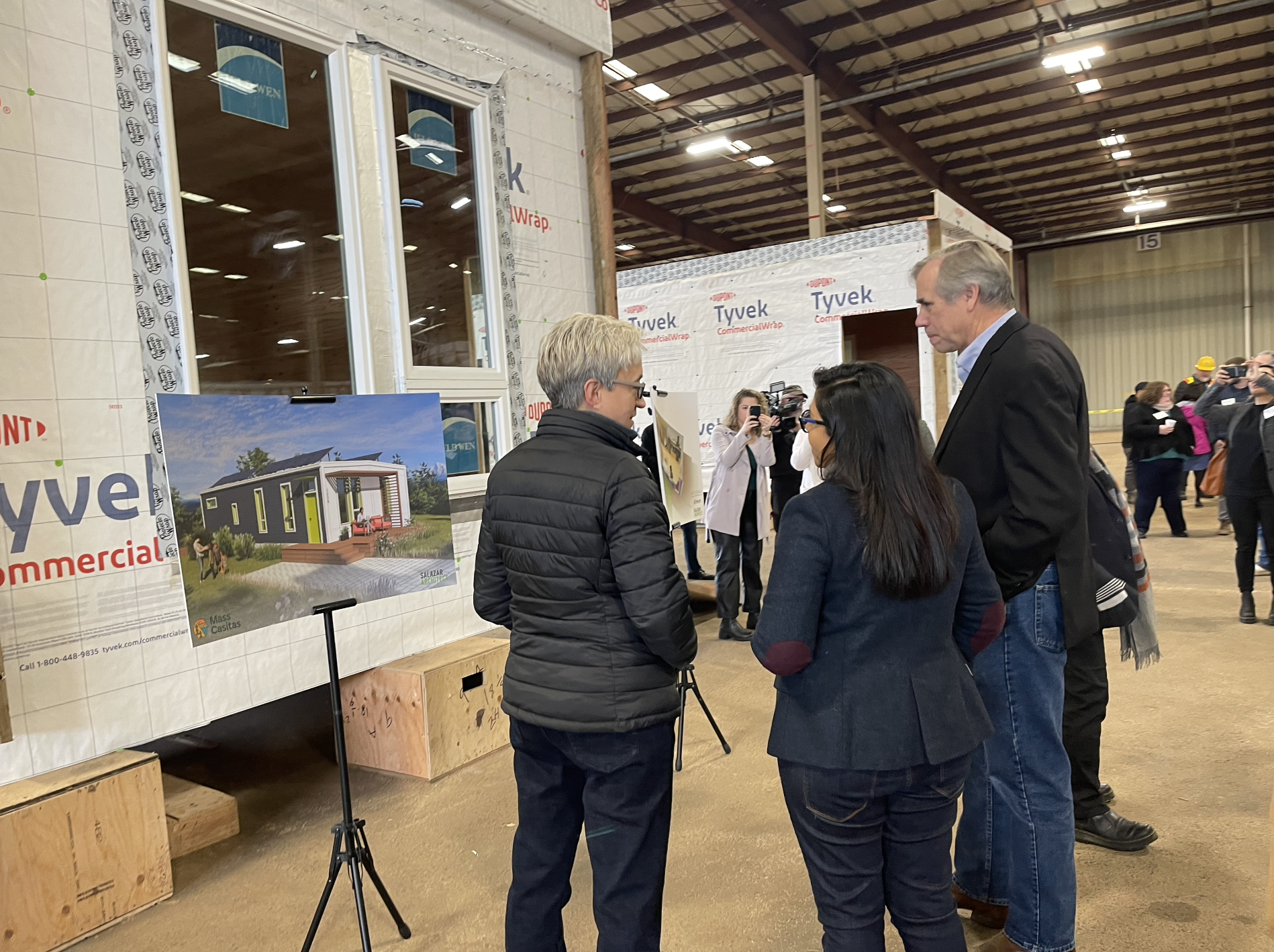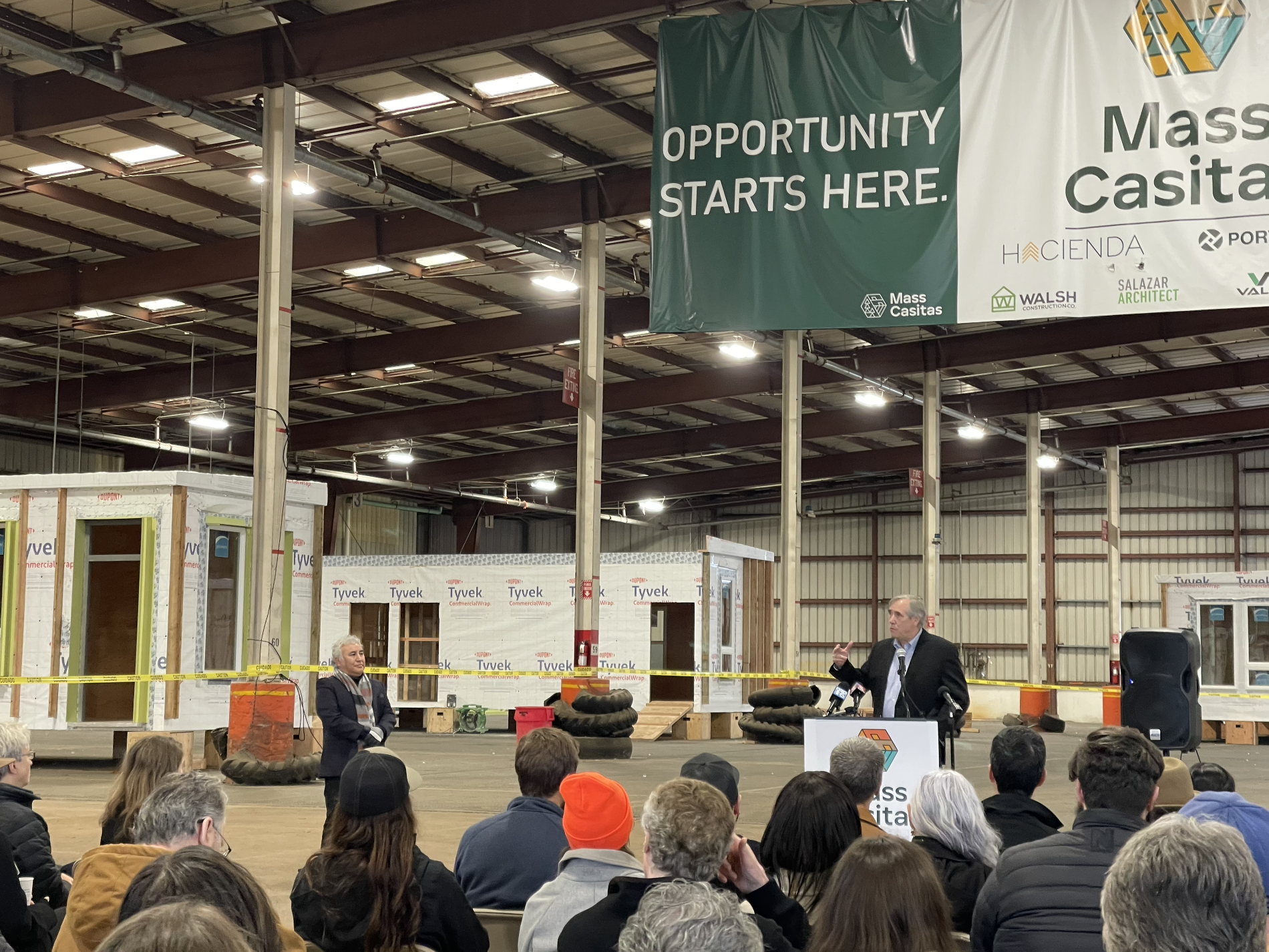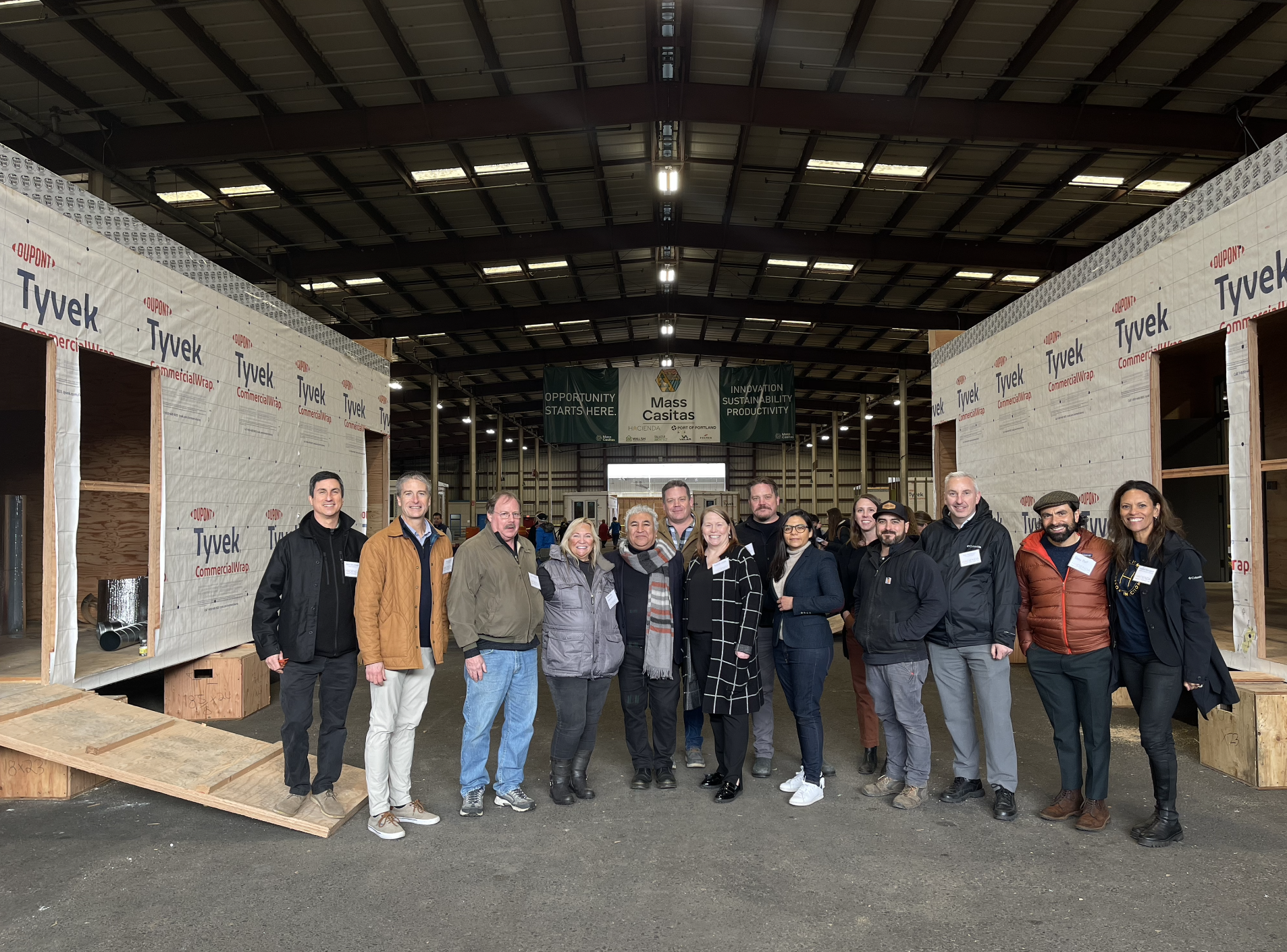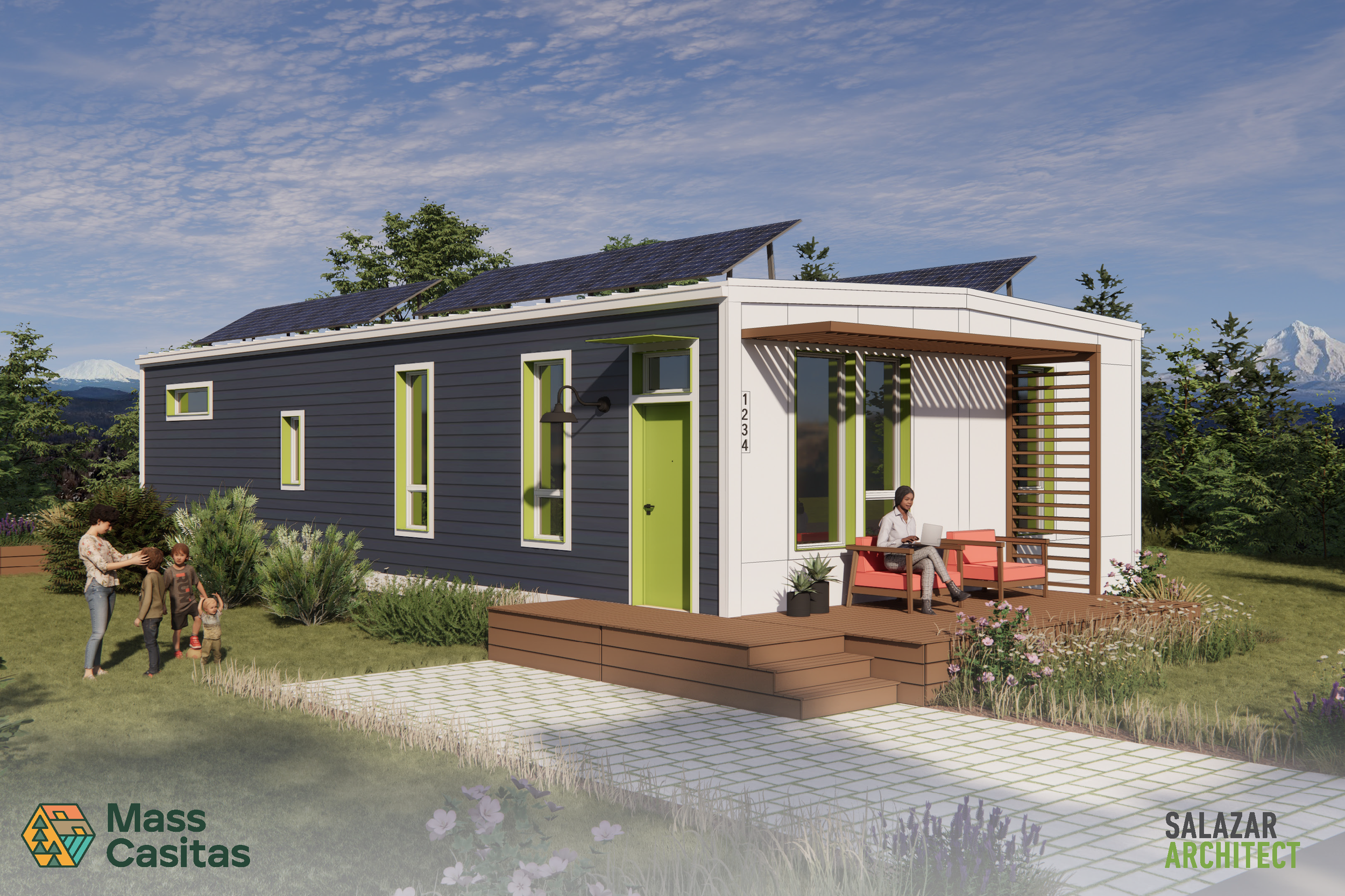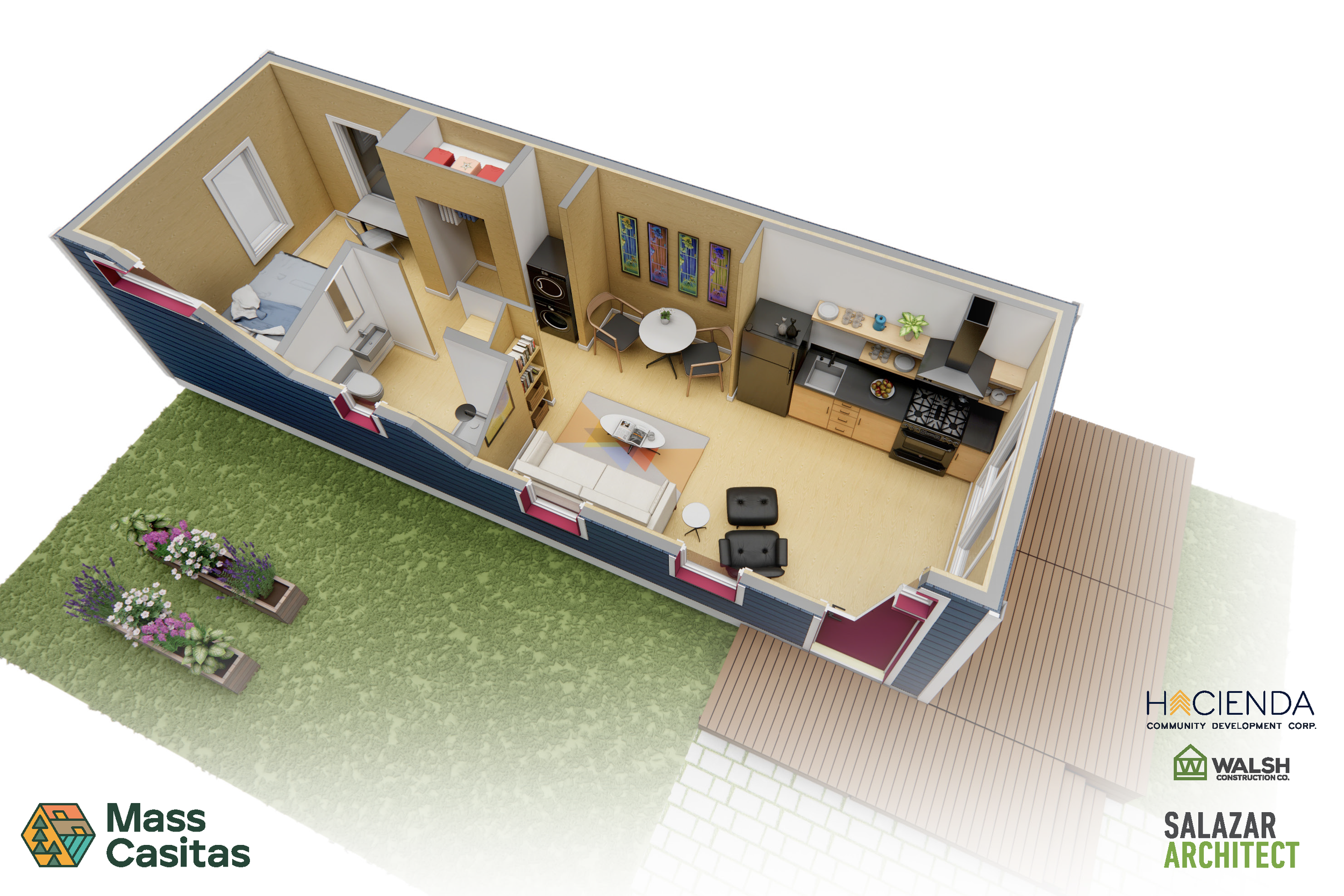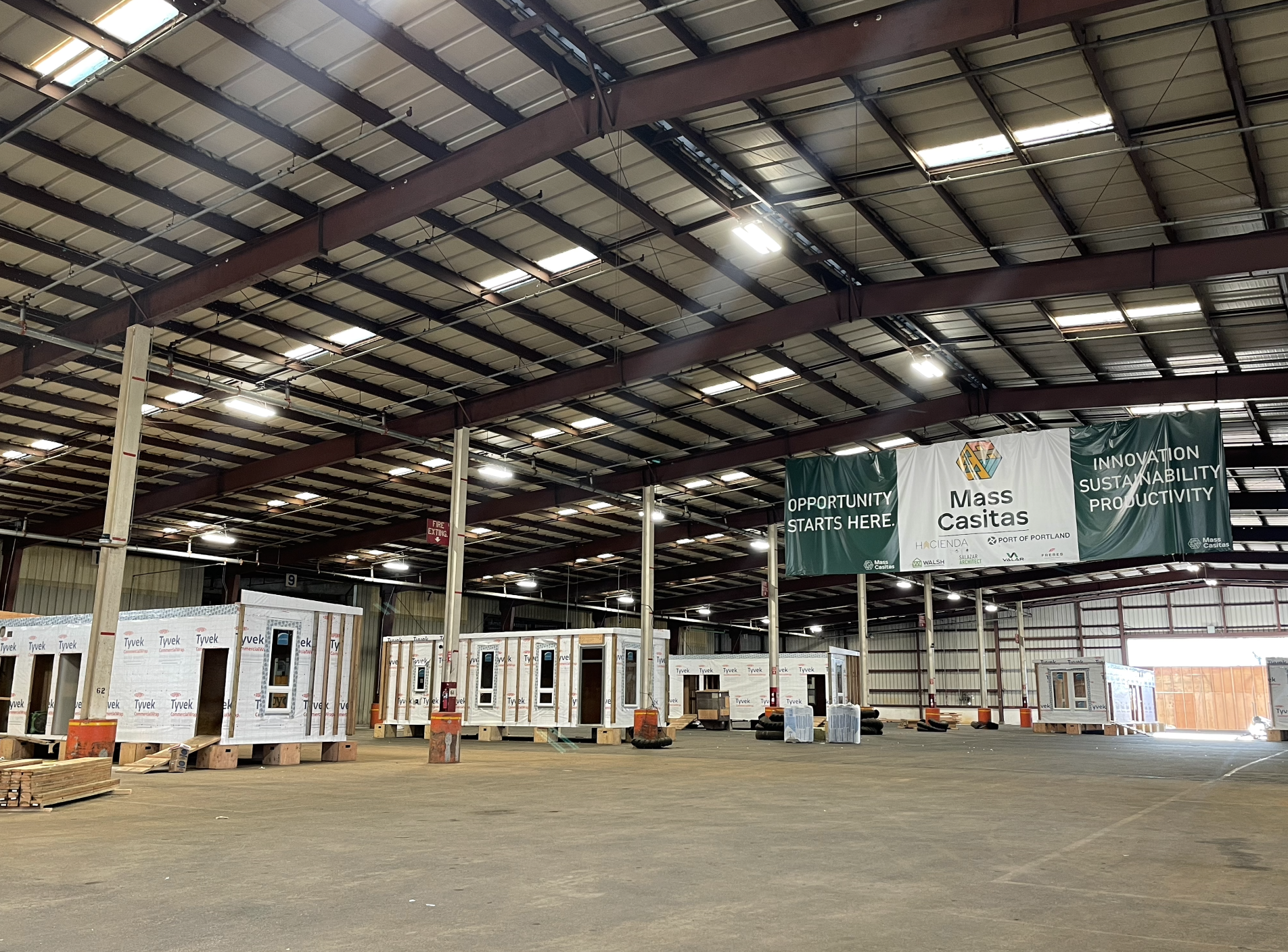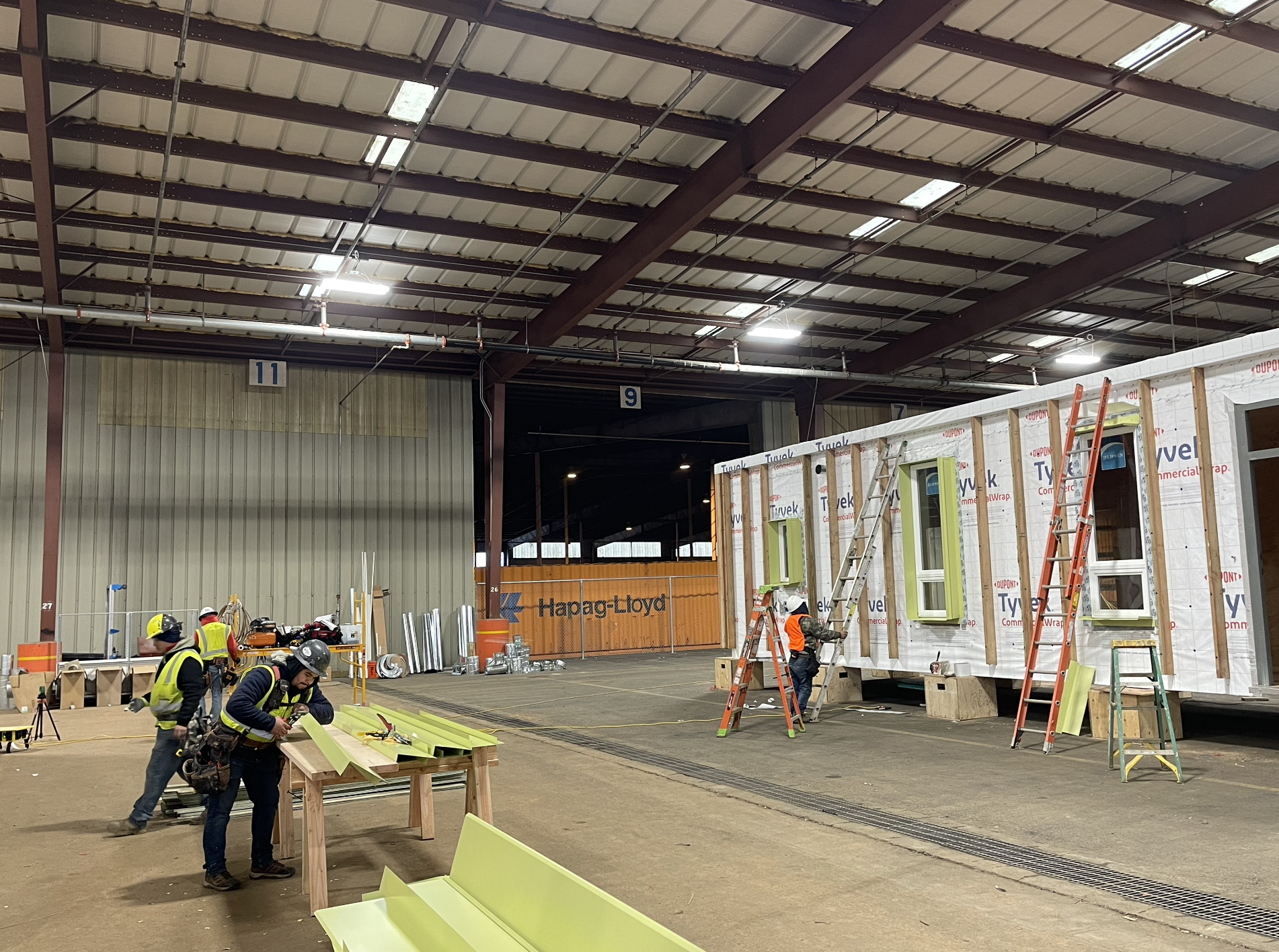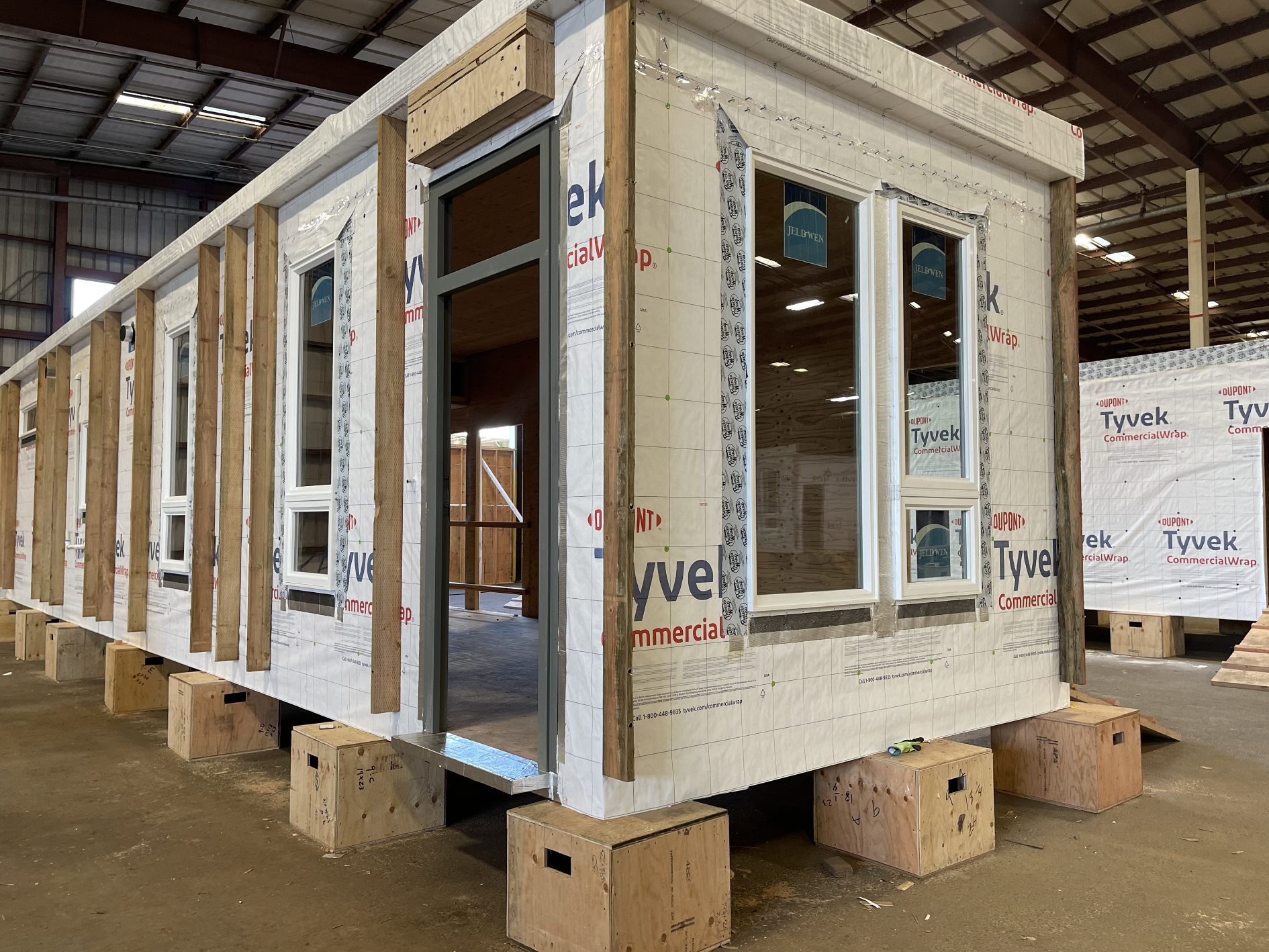The modular homes made from Oregon-grown mass-timber, arriving in communities this summer, may offer a speedier solution to state’s housing crisis
OTIS, Ore., June 7, 2023 — This morning in Otis, a small Lincoln County community near the Oregon coast, Barbara and Scott Benedict stood on their rural property and watched as a crane lifted a pair of large boxes off of two flatbed trucks. By early afternoon, workers had placed the two boxes, or modules, together to form the Benedicts’ new home, replacing the one destroyed in 2020 by the Echo Mountain Fire near Lincoln City.
The Benedicts’ new “Mass Casita” is one of six prototype homes developed by Hacienda CDC and built from Oregon-grown mass timber. Last month, they began arriving in Oregon communities; nearly all will be ready for their owners to occupy them later this summer.
The home deliveries are the latest chapter in the story of Mass Casitas, an innovative pilot project that is among the first of its kind in the nation. Led by Hacienda CDC, a statewide housing organization based in Portland, the project aims to demonstrate how modular housing built with mass timber could provide a more efficient, faster and less expensive way to build housing and ease Oregon’s housing shortage.
Oregon is short 140,000 housing units and needs to build more than a half-million homes over the next 20 years in order to keep up with demand. Gov. Tina Kotek has set a construction target of 36,000 units per year, an 80% increase over current production. Reaching that goal will require innovative solutions that can generate housing much faster than Oregon does now.
“Oregon urgently needs more homes, not only for families displaced by disasters like wildfires, but for our many rural and urban communities that simply don’t have enough housing,” said Ernesto Fonseca, CEO of Hacienda. “With Mass Casitas, we’re developing a process that could add many more homes throughout the state, at a faster pace than traditional construction.”
From design to delivery
Beginning in June 2022, the six prototype Mass Casitas were designed and developed at the Port of Portland’s Terminal 2. So far, three of the six prototypes have been delivered to Otis (one home) and Talent (two homes). A fourth home will be delivered to Madras in June; the remaining two homes will be installed in Portland later this summer.
At the Port, large panels of mass timber plywood were assembled into the boxes, or modules, that form the homes. After the walls were framed, crews installed mechanical, electrical and plumbing systems, as well as windows, insulation, and roof structures. The boxes were then placed onto trucks and delivered to their new communities.
On site in Otis, the two modules for the Benedicts’ home were lifted by crane off of two flatbed trucks and placed together on a concrete foundation to form one 1,136 sq. ft. structure. Over the next four to six weeks, crews will affix the two modules to the foundation, join them together, and complete a range of finishing work — such as insulating the crawl space, hooking up utilities, and completing interior doors and trim. The Benedicts will move in by late July.
Over the next year, the Mass Casitas team will work with Mass Casitas residents to monitor how the structures perform in different Oregon climates. The team will use what they learn to improve the design of Mass Casitas and inform the production process.
Potential to scale up, community partners
Hacienda’s Mass Casitas project includes the design, development, delivery and field-testing of six prototype homes. Going forward, Hacienda continues to explore how to produce Mass Casitas on a larger scale, potentially as part of a federally funded project that envisions the Port of Portland’s Terminal 2 as a new Mass Timber Innovation Hub.
In communities, Hacienda has worked with nonprofit partners to help identify and/or select the families who will live in the Mass Casitas. The six homes (which range in size from studios to 3-bedroom models) have been or will be delivered to these four communities:
1 home arrived today in Otis (Lincoln County); partner is Cascade Relief Team
2 homes are on site in Talent (Jackson County); partner is Casa of Oregon
1 home is going to Madras (Jefferson County); partner is Casa of Oregon
2 homes are going to Portland (Multnomah County); partner is Community Vision
During the December 2021 special session, the Oregon Legislature allocated $5 million for Mass Casitas to the Port of Portland, which has provided the warehouse space and fund management and partnered with Hacienda, the housing organization leading the project. Other key team members are: Salazar Architect Inc. (design), Walsh Construction Co. (general contractor), and Freres Engineered Wood (mass timber supplier/expert).
###
Construction is underway on six prototype homes headed to Oregon communities this summer
PORTLAND, Ore.— Inside a sprawling warehouse at the Port of Portland’s Terminal 2, a potential solution to ease Oregon’s housing shortage is swiftly taking shape. Workers are assembling six prototype modular homes using Oregon-produced mass timber that will soon house pre-selected families and individuals in four communities (Madras, Otis, Portland and Talent). Led by Hacienda CDC, the pilot project (among the first of its kind in the nation) aims to demonstrate how modular housing built with mass timber could provide a more efficient, faster and less expensive way to build housing. The pilot was spearheaded by $5 million in funding from the Oregon Legislature.
On Friday, Hacienda offered a first look at the prototype homes, called Mass Casitas, to city and state officials, including Oregon Governor Tina Kotek and Senator Jeff Merkley, community leaders, and the media at the Port of Portland’s Marine Terminal 2.
“We need more homes now to address Oregon’s urgent housing crisis, and traditional systems alone will not be enough to get the job done. Mass Casitas is innovative because we’re combining mass timber with modular single-family home construction to develop a process that could help Oregon add more high-quality housing, faster,” said Ernesto Fonseca, CEO of Hacienda.
State economists have said that Oregon has a shortage of 110,000 housing units for current residents at all income levels. To accommodate future growth, the state may need to build more than 580,000 homes by 2040. The greatest need is among residents with the lowest incomes.
“I was excited to advocate for $5 million dollars to support this vision in its infancy, and I’m thrilled today to see its first major step forward. The Mass Casitas project is proof that, together, we can act with the urgency people across our state are demanding. Bold ideas, concrete solutions, disciplined follow through. That’s how we can deliver results,” said Kotek.
The vision of Mass Casitas extends beyond housing, Fonseca said. With additional public and private investment, the model has the potential to accelerate the growth of Oregon’s mass timber industry and create new jobs — and in the process, help to revitalize former logging communities and increase economic opportunities for Oregonians, especially in rural communities and communities of color.
Visitors who toured the Mass Casitas production site on Friday saw the six prototype homes under construction. Once complete, the homes will be donated and delivered to nonprofit organizations in four Oregon communities by June 2023. The nonprofits will select which individuals and families will live in the homes.
The six prototype homes (which range in size between 1-3 bedrooms) are headed for these four Oregon communities:
1 home is going to Madras (Jefferson County); partner is Casa of Oregon
1 home is going to Otis (Lincoln County); partner is Cascade Relief Team
2 homes are going to Portland (Multnomah County); partner is Community Vision
2 homes are going to Talent (Jackson County); partner is Casa of Oregon
Following delivery of the prototypes, the Mass Casitas team will monitor how the homes perform in different climates and their utility to residents, using what they learn to improve the design, inform the production process and assess the potential of creating the units at scale.
"Mass Casitas is helping transform Terminal 2 into a site for innovation, mass timber industry transformation, and opportunity for Oregon families," said Keith Leavitt, chief trade & equitable development officer at the Port of Portland. "This project is even more evidence that mass timber can be transformative for Oregon, and it's full of opportunity for those who have been left behind, from new housing options to the creation of good-paying jobs along the timber and housing construction supply chain."
During the December 2021 special session, the Legislature allocated $5 million for Mass Casitas to the Port of Portland, which is providing the warehouse space and fund management and partnered with Hacienda, the housing organization leading the project. Other key team members are: Salazar Architect Inc. (design), Walsh Construction Co. (general contractor), VALAR Consulting Engineering (engineering), and Freres Engineered Wood (mass timber supplier/expert).
###
About Hacienda CDC
Hacienda CDC is a trusted Latino/x-led community-building organization that strengthens BIPOC and low-income communities through affordable housing and holistic services for adults, families and youth. Founded in 1986 in Portland’s Cully neighborhood, Hacienda has grown to support underserved communities that face barriers to opportunity throughout urban and rural Oregon. Through our own innovative approaches and high-impact partnerships, Hacienda develops affordable housing and provides client-centered services and programs that enable people to thrive and achieve their dreams of home ownership, entrepreneurship and education. Learn more at haciendacdc.org.
Learn more about Mass Casitas and this Innovative solution to address the housing crisis
On December 14th, the Oregon Legislature, in Special Session, approved a $5 million appropriation for the Port of Portland and Hacienda Community Development Corporation to build prototypes of modular housing units, made from mass timber, that can be deployed to various sites throughout Oregon.
The mass timber modular manufacturing facility at the Port’s Marine Terminal 2 aims to support Oregon’s emerging mass timber industry, grow regional economic development opportunities, create career pathways and business opportunities for struggling communities, and accelerate housing production.
The Port and Hacienda joined together with the Oregon Mass Timber Coalition to create a strategy to accelerate housing production. Speaking to the Legislature, Curtis Robinhold, Executive Director of the Port of Portland, said: “Legislative funding will help pay for Hacienda CDC and the Port of Portland to develop, manufacture and deploy prototype modular houses made from mass timber in at least three Oregon communities in the next 12-24 months. The prototype housing units will be barged and trucked from Terminal 2 to communities throughout Oregon to provide housing opportunities to communities in need.”
Ernesto Fonseca, CEO of Hacienda CDC said: “Hacienda’s core mission is providing affordable housing for individuals and families in our community. As affordable housing needs continue to evolve, we are committed to exploring and advancing new ways to meet the needs of our diverse Oregon communities. This partnership with the Port of Portland fills a gap for modular housing developed right here in Oregon, providing not only new housing options but job opportunities and new markets for Oregon wood products. Additionally, developing modular homes will address construction labor shortages in smaller and rural Oregon communities and could offer rapid response options to address housing shortages created by emergencies, like wildfires. We appreciate the Legislature’s investment and the opportunity to partner with the Port of Portland.”
Robinhold continued, “Given the magnitude of need for more housing options for people at all income levels throughout Oregon, it’s clear that we need innovation and faster ways to produce homes. The modular home building industry is emerging, and no factories in Oregon are currently using mass timber technology. Prototyping will put existing research to a new use and demonstrate potential for new modular building concepts. Once tested, manufacturing can be scaled up leading to improved supply and reduced costs, reduced build times and less waste of materials.”
Following the creation of the prototype, Port of Portland and Hacienda will assess the economic, environmental and efficiency of creating these units at scale. Additional potential benefits cited by the partners include: additional jobs in manufacturing, construction and forestry; supporting Oregon’s emerging mass timber industry; and addressing severe housing shortages throughout the state.
Listen to Ernesto and Curtis discuss this project on OPB’s Think Out Loud.
About Port of Portland
Established in 1891 by the Oregon Legislature, the Port of Portland owns four marine terminals, three airports (Portland International, Hillsboro, and Troutdale) and five industrial parks. The mission of the Port is to enhance the region's economy and quality of life by providing efficient cargo and air passenger access to national and global markets.
About Hacienda CDC
Hacienda CDC was formed in 1986 to provide necessary housing and supportive services in a low-income, predominantly Latino community. Hacienda has since built 381 units of community-centered affordable rental housing in communities in North and Northeast Portland and in Molalla. Today, Hacienda is building new affordable housing in NE Portland and Gresham and will more than double the number of affordable homes they offer in the next two years. Hacienda embraces a holistic approach to development and serving Latinos and low-income individuals and families throughout Portland with programs in Community Economic Development, Homeownership Support, and Youth & Family Support Services. Hacienda has grown to become Oregon’s largest Latino-led, Latino-serving housing organization. As Portland’s Latino population has grown rapidly, Hacienda continues building capacity to offer bicultural services to Latinos and other low-income families throughout the Portland metropolitan area.
Want to help increase access to affordable housing in our community? Submit a Design Request for Proposal.

